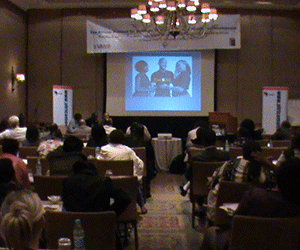“It’s just you and me… and my wife and your boyfriend” is a play that illustrates the role of multiple concurrent partnerships in the spread of HIV. This play and other interventions were discussed in the keynote address which kicked off the AfriComNet Practicum on HIV
The three-day practicum offered by the African Network for Strategic Communication in Health and Development (AfriComNet) brought together 115 experts in HIV communication, program implementation, and policy formulation representing more than 15 countries throughout Africa. Along with MCP, experts also discussed couple counseling and testing, PMTCT, condom use, disclosure of HIV status, prevention within discordant couples, and HIV infection in polygamous marriages.
AfriComNet collaborates with ten educational institutions from eight countries in Africa to develop and institutionalize courses in strategic communication for health and development with a focus on HIV/AIDS. This is AfriComNet’s fourth year of offering a practicum to members of the network.
Key learnings from the practicum included:
- HIV transmission is reduced by two-thirds in discordant couples following couple testing and counseling. A compelling case was made for HIV/AIDS programs to implement and promote couple HIV counseling and testing rather than only offering and promoting voluntary individual counseling and testing. (Cost of averting HIV infections in Africa)
- Unpublished data from a Zvitambo study in Zimbabwe showed 75% mortality in infants of women who sero-converted in late pregnancy. The presentation offered recommendations for focused prevention methods to keep HIV-negative pregnant women negative and advocated for linkages between PMTCT programs and wider prevention/communication efforts. (New approaches in prevention: Reaching HIV-negative pregnant women)
- Qualitative research conducted in ten countries in Africa found common drivers of multiple concurrent partnerships, including sexual dissatisfaction, lack of communication between partners and male entitlement. More innovative programming is needed to address these social norms. (Behavioural Drivers of MCP in Southern Africa)
Twenty-eight presentations are available on the AfriComNet website along with the keynote address from Helen Epstein, internationally known writer and journalist on public health issues and particularly on AIDS in Africa.



